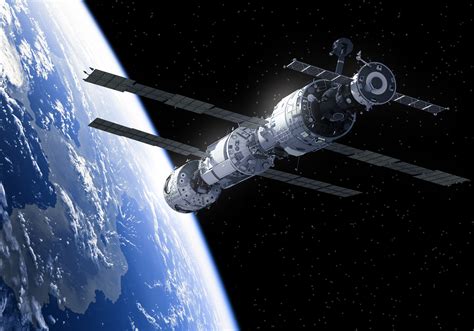Commercial Space Insurance

The commercial space industry has witnessed an incredible surge in recent years, with private companies venturing into space exploration, satellite launches, and even space tourism. As this industry expands, so does the need for comprehensive insurance coverage to protect against the unique risks and challenges associated with space activities. Commercial space insurance plays a crucial role in mitigating financial risks and ensuring the sustainability of space-related ventures. This article delves into the intricacies of commercial space insurance, exploring its importance, key coverage areas, and the evolving landscape of this specialized insurance sector.
Understanding Commercial Space Insurance

Commercial space insurance is a specialized form of coverage designed to protect businesses and organizations involved in space-related activities. It provides financial protection against the numerous risks inherent in space missions, satellite operations, and other space-based ventures. From launch failures and satellite malfunctions to liability claims and property damage, commercial space insurance offers a safety net for entities operating in this high-risk environment.
The insurance industry has recognized the need for specialized policies tailored to the unique challenges of space exploration. These policies go beyond traditional insurance, addressing the specific risks and potential losses that can occur during various stages of space missions. Whether it's protecting against the financial fallout of a launch mishap or providing coverage for potential environmental damage, commercial space insurance plays a critical role in the success and sustainability of the commercial space sector.
Key Coverage Areas
Commercial space insurance encompasses a wide range of coverage areas, each tailored to address specific risks and challenges. Here’s an overview of some critical aspects of this specialized insurance:
- Launch Coverage: Launch operations are inherently risky, and launch failures can result in significant financial losses. Launch coverage provides protection against these risks, covering expenses related to failed launches, damage to the launch vehicle, and potential third-party liability claims.
- In-Orbit Coverage: Once a satellite or spacecraft is in orbit, it faces various risks, including mechanical failures, collision with space debris, or even intentional interference. In-orbit coverage ensures that the insured is protected against these risks, covering repair or replacement costs, loss of revenue, and potential liability claims arising from satellite operations.
- Ground Operations: Ground operations, including satellite manufacturing, testing, and maintenance, also carry risks. Commercial space insurance covers losses arising from these activities, such as property damage, equipment failures, or liability claims resulting from accidents during ground-based operations.
- Third-Party Liability: With the increasing presence of private companies in space, the risk of third-party liability claims has grown significantly. Commercial space insurance provides coverage for legal and financial obligations arising from damage or injury caused to third parties, including other spacecraft, satellites, or individuals, during space-related activities.
- Payload Insurance: Payload, which includes scientific instruments, communication devices, and other cargo, is a critical component of space missions. Payload insurance ensures that the insured is protected against losses resulting from damage, loss, or failure of the payload, covering the cost of repair, replacement, or data recovery.
- Cyber and Data Risks: In the digital age, space missions are highly reliant on technology and data. Commercial space insurance now includes coverage for cyber risks, protecting against data breaches, hacking attempts, and other digital threats that could compromise mission integrity or lead to financial losses.
| Coverage Area | Key Benefits |
|---|---|
| Launch Coverage | Protects against financial losses due to launch failures, covering vehicle damage and third-party liability. |
| In-Orbit Coverage | Provides comprehensive protection for satellites and spacecraft, covering repair/replacement costs, loss of revenue, and liability claims. |
| Ground Operations | Covers losses arising from satellite manufacturing, testing, and maintenance, including property damage and liability claims. |
| Third-Party Liability | Offers financial protection against legal obligations arising from damage or injury caused to third parties during space activities. |
| Payload Insurance | Ensures the insured is protected against losses related to payload damage, loss, or failure, covering repair/replacement and data recovery. |
| Cyber and Data Risks | Provides coverage for cyber threats and data breaches, safeguarding mission integrity and preventing financial losses. |

The Evolving Landscape of Commercial Space Insurance

As the commercial space industry continues to grow and innovate, the landscape of commercial space insurance is also evolving. Insurance providers are constantly adapting their policies and coverage options to keep pace with the changing dynamics of space exploration and satellite technology.
Adapting to Technological Advancements
The rapid advancement of space technology has led to the development of new risks and challenges. Insurance providers are working closely with space industry experts to understand these emerging risks and tailor their policies accordingly. For instance, with the increasing use of reusable launch vehicles and the rise of space tourism, insurance policies are being adjusted to address the unique risks associated with these innovations.
Additionally, the integration of advanced technologies like artificial intelligence and machine learning in space missions is prompting insurance companies to explore coverage for potential risks associated with these systems. From autonomous spacecraft to satellite swarms, the insurance industry is actively researching and developing solutions to ensure comprehensive protection.
Addressing Environmental Concerns
The issue of space debris and its potential impact on space operations has become a significant concern for the industry. Commercial space insurance policies are now incorporating coverage for environmental risks, ensuring that insured entities are protected against the financial fallout of space debris-related incidents. This includes the cost of debris removal, potential liability claims, and even the impact of space debris on mission operations.
Incorporating Cyber Security Measures
With the increasing reliance on digital systems and data in space missions, the risk of cyber attacks and data breaches has become a critical concern. Insurance providers are integrating cyber security measures into their policies, offering coverage for potential losses arising from cyber threats. This includes protection against data theft, system disruptions, and the financial implications of cyber attacks.
Conclusion
Commercial space insurance is an essential component of the burgeoning space industry, providing critical financial protection and peace of mind to businesses and organizations operating in this high-risk environment. As the industry continues to innovate and expand, the role of commercial space insurance will only become more vital. By staying abreast of the latest technological advancements, environmental concerns, and cyber security threats, insurance providers are ensuring that the commercial space sector remains resilient and sustainable.
FAQ
What is the primary purpose of commercial space insurance?
+Commercial space insurance is designed to provide financial protection to businesses and organizations involved in space-related activities. It covers a wide range of risks, including launch failures, satellite malfunctions, property damage, and third-party liability claims.
How has commercial space insurance evolved to keep up with technological advancements in the space industry?
+Insurance providers have adapted their policies to address the unique risks associated with emerging technologies in space exploration. This includes coverage for reusable launch vehicles, space tourism, and the integration of AI and machine learning in spacecraft.
What are some key coverage areas within commercial space insurance policies?
+Key coverage areas include launch coverage, in-orbit coverage, ground operations, third-party liability, payload insurance, and protection against cyber and data risks.
How do insurance providers address the issue of space debris and its potential impact on space operations?
+Commercial space insurance policies now include coverage for environmental risks, ensuring protection against the financial consequences of space debris-related incidents, such as debris removal and liability claims.
What measures are insurance providers taking to address cyber security threats in space missions?
+Insurance companies are integrating cyber security measures into their policies, offering coverage for potential losses arising from cyber attacks, data breaches, and system disruptions.



